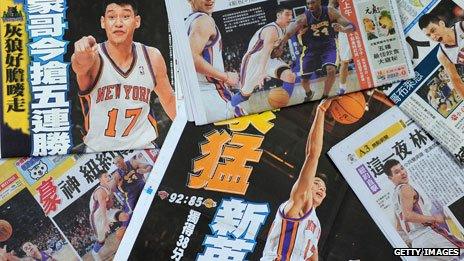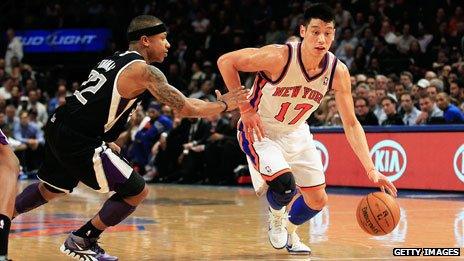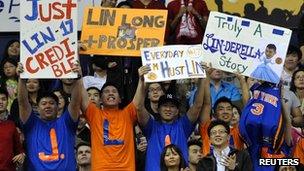'Linsanity' hits Taiwan as Jeremy Lin conquers NBA
- Published

The Taiwanese media has covered every step of Lin's rise to stardom
A few weeks ago, he was a struggling basketball player sleeping on his brother's sofa. Now Jeremy Lin is a household name in the US. But perhaps his most fervent fans reside thousands of miles away in a corner of south-east Asia, says the BBC's Cindy Sui.
Lin began the month as an NBA unknown, a New York Knicks squad player yet to start a professional basketball game.
By the time he scored a last-second three-pointer to lead the team to its sixth successive victory on Tuesday, against the Toronto Raptors, Lin had become the most talked-about player in the basketball world.
But it's not just Americans who are proud of the 23-year-old point guard. Halfway across the world, in Lin's ancestral home of Taiwan, he has become a local hero.
Lin is the first American basketball player of Taiwanese descent to play in the NBA. Not only has he made it into a league that sees few Asian players, he's become an overnight sensation on court.
He was named the NBA's Player of the Week, only the second Asian player to earn that honour. The first was China's Yao Ming, who recently retired.
"Linsanity" has now captured the imagination of millions of basketball fans in the US, China and other parts of Asia, with Lin now boasting hundreds of thousands of followers on social media sites.
An estimated three million people in Taiwan have watched each one of his games. There is constant news coverage of him, with news channels flashing headlines when he spearheads a Knicks victory.
Taiwanese newspapers splash his picture on the front page, with some running multi-page special reports.
"He's become a household name in Taiwan. Even people who don't play basketball are talking about him," says Michael Lee, deputy secretary general of the Chinese Taipei Basketball Association.
"We treat him as a pride of Taiwan."
Lin's parents were born in Taiwan. Although the player himself was born and bred in America, he can speak Mandarin and has visited Taiwan to coach young players.

Taiwanese people consider him a local son, and even relatives in Taiwan have become a focus of media attention.
"I am so happy he plays the basketball so well. He's the best," Lin's grandmother Linchu Amien told reporters.
Lin's father's home, Changhua County, is talking about designating him an honorary citizen, a county spokesman told the BBC.
Last year, Lin taught children at a basketball camp in the county. The Taipei Times newspaper quoted Wu Cheng-liang, a student coached by the player, as saying that the students had asked Lin how an Asian player like him could compete with some of the more muscular players in the NBA.
Lin urged them to "never give up".
"With diligent practice, I stand a chance of overtaking them," Ms Wu quoted Lin as saying. "Just never give up on anything, and never underestimate yourself."
At sports bars and breakfast eateries in Taipei on Wednesday morning (Tuesday night in the US), people gathered or lingered - despite it being a working day - to watch live coverage of the Knicks-Raptors game, cheering every time Lin scored.
He helped the Knicks clinch their sixth consecutive victory by scoring a crucial six points in the last few seconds of the game.
Overlooked
Lin had been overlooked by recruiters at some of the top US university basketball teams, eventually landing at Harvard. He was cut by two other NBA teams before becoming a Knick in December 2011.
He was one of several players to step into the position of point guard while New York's regular recovered from an injury and one of his team's top scorers took a leave of absence.
But an impressive showing by Lin that led the Knicks to a victory secured him more time on the court and eventually, a place in the current starting lineup.
He has become an inspiration to many of Asia's youngsters, especially those in Taiwan. They love watching NBA games, but rarely get to see someone who looks like them play, especially as the team's star.
"Having someone with the same skin colour as us playing in the NBA makes us feel closer to the game," said Tsai Ming-juang, a 22-year-old college student.
"It's like - oh, we have a compatriot playing. It's not like we're just watching people who have no direct connection to us.

At Tuesday's game in Toronto, fans cheered for Lin
"We feel very proud and that perhaps we'll have more and more opportunities to play in the NBA and that we won't be excluded and just be an audience member, and that we'll see more and more Asians playing in the games."
Lin has impressed his fans not only with his skill on the court, but also with his determination to overcome setbacks and the ability to make the most of his opportunities.
"From him, I can learn that as long as you don't give up, success will not be far away," said Randolph Cheng, an 18-year-old interior design student.
Lin's success in both his studies and in sport has also encouraged Taiwanese society to rethink its traditional belief that teenagers should put aside their interests, even their passion, to do well in school and get a well-paid job, Michael Lee said.
Lin has also helped Taiwanese people become more confident.
"His height is only 191cm (6ft 3in). Taiwan actually has many basketball players with that sort of physique. So it's just a matter of being confident in ourselves," Mr Lee said.
Mr Lee and others plan to invite Lin to play for Taiwan, aiming to boost the island's second-favourite sport, which struggles with a lack of lucrative sponsorship.
Even beyond his crossover dribbles, court vision, passing skills and ability to drive to the hoop, Lin is a source of tremendous pride in Taiwan.
Many Taiwanese people feel the island has not been given the respect it deserves because it is not officially recognised as a country by the United Nations. Powerful China still claims it as a province.
It's hoped that having a sports sensation like Lin will give Taiwan some of the international attention it so often craves.
"At Jeremy's games, Taiwanese fans hold up Taiwan's national flag," says Mr Lee. "It's very rare for Taiwan to be able to display its international flag at such high-profile events."
"This is very encouraging for Taiwanese people," he adds. "It will have a positive impact on Taiwan's global image."